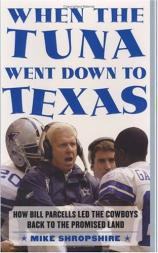When the Tuna Went Down to Texas: How Bill Parcells Led the Cowboys Back to the Promised Land
Review
When the Tuna Went Down to Texas: How Bill Parcells Led the Cowboys Back to the Promised Land
Reading is often a solitary and silent pastime. Occasionally the
solitude may be interrupted by a desire to share a humorous line
with someone within earshot. Sometimes, the reader laughing out
loud can break the silence generally present when reading. While
reading WHEN THE TUNA WENT DOWN TO TEXAS: How Bill Parcells Led the
Cowboys Back to the Promised Land, by Mike Shropshire, this reader
had numerous moments of laughing out loud and savoring classic
comments by the author in hopes of remembering those lines for
future use.
In the mid-90s the Dallas Cowboys were a football juggernaut,
destroying opponents on a weekly basis. Dynasties end for many
reasons. To some degree the Cowboys' reign ended because new rules
were put in place that limited the ability of franchises to string
championship seasons together. Salary caps and free agency, now an
essential part of the NFL player agreement, make it far more
difficult for a team to build and maintain the foundation of
players that allow a team to continually repeat winning seasons.
But free agency and salary caps were not the only reasons for the
downfall of the Cowboys. Several cracks in the foundation of the
empire were self-inflicted. The story of the Cowboys' road to
mediocrity began with a star player and two precious little
hookers.
The star player was wide receiver Michael Irvin, whose liaison with
working girls led to a felony drug possession charge. Even a
celebrity such as Irvin faced danger in the Texas criminal justice
system. As a former prosecutor in Dallas observed to Shropshire, "I
don't really know the facts of this particular case, but if the
prosecution can get a couple of Lutherans on the jury, then Irvin
will get a maximum sentence." The criminal prosecution destroyed
the franchise. Former Green Bay Packer star Jerry Kramer observed,
"Whenever I see the Cowboys on TV, I don't know who to root for ---
the defense or the prosecution. No, this will never be America's
Team, if it is then woe for America."
The man in charge of the Cowboys during their trip from the top of
the heap to the bottom was Jerry Jones, an Arkansas businessman
described by many as coming across "like the banjo picker in
Deliverance." Shropshire interviewed Jones for Sports
Illustrated immediately after the purchase of the franchise and
the two men shared grudging respect. Jones was actively involved in
every aspect of running the Cowboys. If allowed by the NFL he would
have considered coaching the team, but that wish was not to be
approved. Instead, he hired coaches that he could control. As long
as the Cowboys had great talent, total control was successful. But
as the talent level of America's team declined, the need for an
outstanding coach grew. Before the Parcells era would commence,
Jones hired Dave Campo. As Shropshire observes, "the Dave Campo
regime shortly became a living-color illustration of what happens
when the Peter Principle collides head-on with Murphy's Law. Since
Campo was universally hailed as a 'nice guy,' he could also serve
as exhibit A to the Leo Durocher doctrine --- the one that mandates
where nice guys will inevitably finish." After a losing season in
2002, Dave Campo was fired.
Enter Bill Parcells. Football fans were stunned. Sports
Illustrated voiced the opinion of the country: "Are You Kidding
Me?" But it was no joke. Jones gave Parcells full and free reign to
run the team, and the future Hall of Fame inductee did not
disappoint his owner. WHEN THE TUNA WENT DOWN TO TEXAS gives the
football fanatic an outline for building or rebuilding a franchise.
Start with a head coach who remembers every crucial play that cost
him a game during his coaching career as well as the assistant
coach who designed and called the play. When the opportunity
presents itself, hire that innovative assistant coach for your new
team. Next, find a few quality players as a foundation for the
team. Parcells believed strongly in the "80-20" theory that goes
with any successful organization. Under that rule, the 20 percent
of the workforce that's the most talented always generates 80
percent of the positive results. For the woeful Cowboys, even that
20 percent was a difficult task.
Parcells persevered. Somehow he led the Cowboys to the playoffs in
that first year. Shropshire chronicles the season, some games in
detail, others in passing. Fanatical fans may find WHEN THE TUNA
WENT DOWN TO TEXAS light on statistics and fantasy football
minutiae. Most fans will enjoy this book for what it is: an
irreverent and humorous look at the game of football and three of
its icons --- a franchise, an owner and the Tuna.
Reviewed by Stuart Shiffman on January 24, 2011
When the Tuna Went Down to Texas: How Bill Parcells Led the Cowboys Back to the Promised Land
- Publication Date: August 31, 2004
- Genres: Nonfiction, Sports
- Hardcover: 256 pages
- Publisher: William Morrow
- ISBN-10: 0060572116
- ISBN-13: 9780060572112




